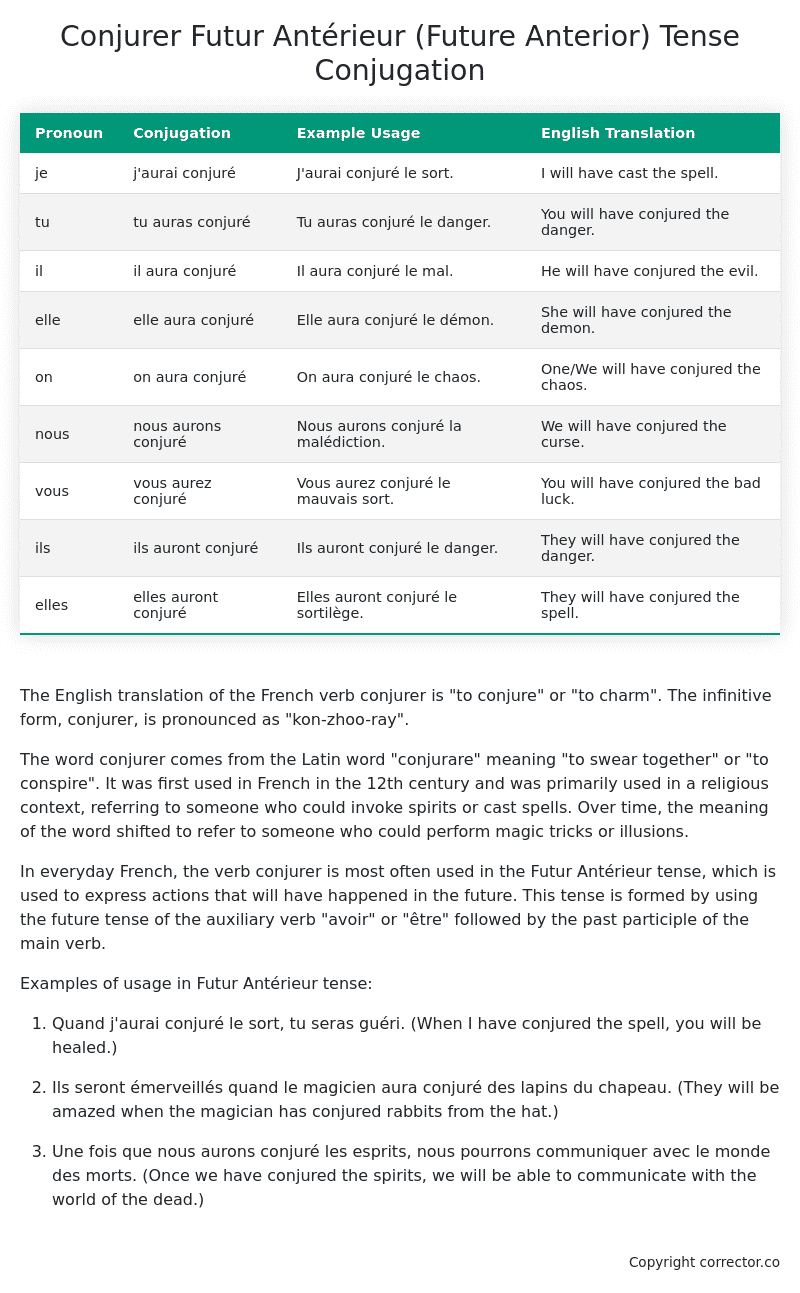Futur Antérieur (Future Anterior) Tense Conjugation of the French Verb conjurer
Introduction to the verb conjurer
The English translation of the French verb conjurer is “to conjure” or “to charm”. The infinitive form, conjurer, is pronounced as “kon-zhoo-ray”.
The word conjurer comes from the Latin word “conjurare” meaning “to swear together” or “to conspire”. It was first used in French in the 12th century and was primarily used in a religious context, referring to someone who could invoke spirits or cast spells. Over time, the meaning of the word shifted to refer to someone who could perform magic tricks or illusions.
In everyday French, the verb conjurer is most often used in the Futur Antérieur tense, which is used to express actions that will have happened in the future. This tense is formed by using the future tense of the auxiliary verb “avoir” or “être” followed by the past participle of the main verb.
Examples of usage in Futur Antérieur tense:
-
Quand j’aurai conjuré le sort, tu seras guéri. (When I have conjured the spell, you will be healed.)
-
Ils seront émerveillés quand le magicien aura conjuré des lapins du chapeau. (They will be amazed when the magician has conjured rabbits from the hat.)
-
Une fois que nous aurons conjuré les esprits, nous pourrons communiquer avec le monde des morts. (Once we have conjured the spirits, we will be able to communicate with the world of the dead.)
Table of the Futur Antérieur (Future Anterior) Tense Conjugation of conjurer
| Pronoun | Conjugation | Example Usage | English Translation |
|---|---|---|---|
| je | j’aurai conjuré | J’aurai conjuré le sort. | I will have cast the spell. |
| tu | tu auras conjuré | Tu auras conjuré le danger. | You will have conjured the danger. |
| il | il aura conjuré | Il aura conjuré le mal. | He will have conjured the evil. |
| elle | elle aura conjuré | Elle aura conjuré le démon. | She will have conjured the demon. |
| on | on aura conjuré | On aura conjuré le chaos. | One/We will have conjured the chaos. |
| nous | nous aurons conjuré | Nous aurons conjuré la malédiction. | We will have conjured the curse. |
| vous | vous aurez conjuré | Vous aurez conjuré le mauvais sort. | You will have conjured the bad luck. |
| ils | ils auront conjuré | Ils auront conjuré le danger. | They will have conjured the danger. |
| elles | elles auront conjuré | Elles auront conjuré le sortilège. | They will have conjured the spell. |
Other Conjugations for Conjurer.
Le Present (Present Tense) Conjugation of the French Verb conjurer
Imparfait (Imperfect) Tense Conjugation of the French Verb conjurer
Passé Simple (Simple Past) Tense Conjugation of the French Verb conjurer
Passé Composé (Present Perfect) Tense Conjugation of the French Verb conjurer
Futur Simple (Simple Future) Tense Conjugation of the French Verb conjurer
Futur Proche (Near Future) Tense Conjugation of the French Verb conjurer
Plus-que-parfait (Pluperfect) Tense Conjugation of the French Verb conjurer
Passé Antérieur (Past Anterior) Tense Conjugation of the French Verb conjurer
Futur Antérieur (Future Anterior) Tense Conjugation of the French Verb conjurer (this article)
Subjonctif Présent (Subjunctive Present) Tense Conjugation of the French Verb conjurer
Subjonctif Passé (Subjunctive Past) Tense Conjugation of the French Verb conjurer
Subjonctif Imparfait (Subjunctive Imperfect) Tense Conjugation of the French Verb conjurer
Subjonctif Plus-que-parfait (Subjunctive Pluperfect) Tense Conjugation of the French Verb conjurer
Conditionnel Présent (Conditional Present) Tense Conjugation of the French Verb conjurer
Conditionnel Passé (Conditional Past) Tense Conjugation of the French Verb conjurer
L’impératif Présent (Imperative Present) Tense Conjugation of the French Verb conjurer
L’infinitif Présent (Infinitive Present) Tense Conjugation of the French Verb conjurer
Struggling with French verbs or the language in general? Why not use our free French Grammar Checker – no registration required!
Get a FREE Download Study Sheet of this Conjugation 🔥
Simply right click the image below, click “save image” and get your free reference for the conjurer Futur Antérieur tense conjugation!

Conjurer – About the French Futur Antérieur (Future Anterior) Tense
Construction
Common Everyday Usage Patterns
Interactions with Other Tenses
For example
Summary
I hope you enjoyed this article on the verb conjurer. Still in a learning mood? Check out another TOTALLY random French verb conjugation!


